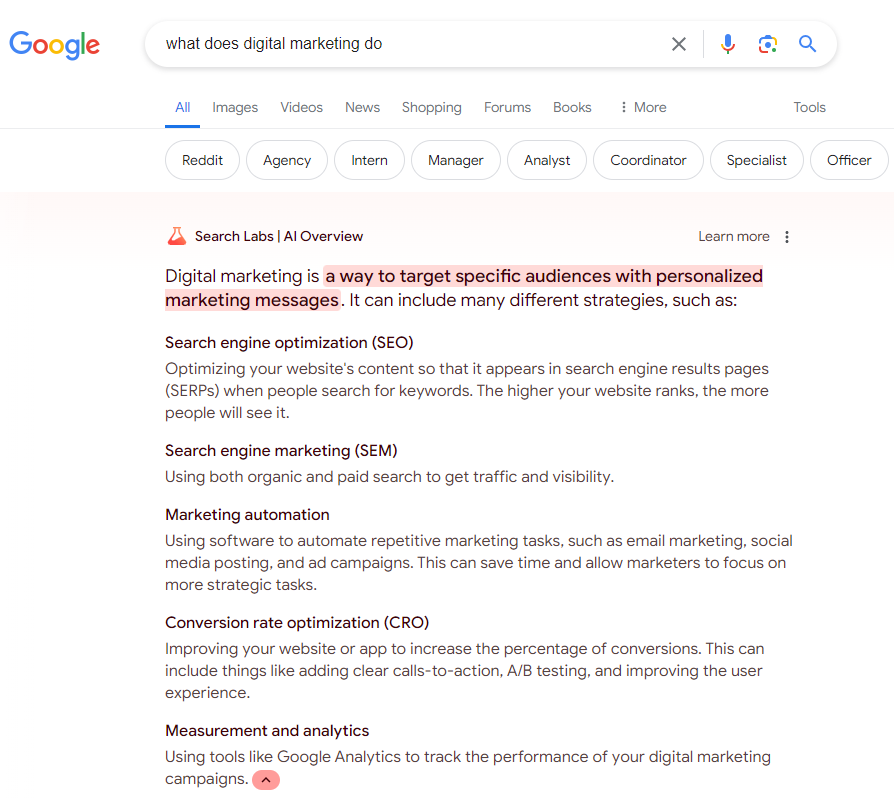In recent years, Google has been at the forefront of integrating artificial intelligence (AI) into its search engine operations, aiming to enhance the user experience and provide more relevant search results. One of the significant developments in this area is the introduction of Google’s AI Overview, a feature designed to offer concise and comprehensive summaries of search queries. However, recent news has highlighted a shift in Google’s strategy, with the company dialing back on AI Overviews in search results. At Pineapple Digital, we experimented with Google’s AI Overviews while it was undergoing beta testing in 2023. Now that it’s officially here, we explore what it means for your SEO and provide actionable for getting ranked in search results.
What is Google’s AI Overview?
Google’s AI Overview is an AI-powered feature that generates brief summaries of search queries directly on the search results page. This tool leverages advanced natural language processing (NLP) algorithms to extract and condense information from various sources, presenting users with a quick snapshot of relevant information without the need to click through multiple links. The goal is to streamline the search process, making it more efficient and user-friendly.

The Recent Shift: Dialing Back on AI Overviews
According to a recent study of Google AI Overviews reported by Search Engine Journal, Google has begun to scale back the prevalence of AI Overviews in its search results. This decision appears to be driven by a combination of factors, including feedback from users and webmasters, as well as the ongoing refinement of AI technologies. The study found that the frequency of AI Overviews appearing in search results has noticeably decreased, indicating a potential shift in Google’s approach to integrating AI summaries into its search ecosystem. Following are key findings from the study:
- Vertical Variability: AI Overviews appear more frequently in certain verticals. For instance, healthcare-related queries triggered AI Overviews 63% of the time, while B2B technology queries did so 32% of the time. In contrast, queries related to restaurants and travel rarely triggered AI Overviews.
- Trigger Factors: Featured Snippets and questions are more likely to trigger AI Overviews. Queries that are task-oriented and seek specific information tend to prompt these summaries. Food and Beverage, Technology and Relationship queries triggered AI Overviews the most, while Healthcare, Legal and News triggered them the least.
- Content Sources: AI Overviews draw information from a range of sources, including Google’s Knowledge Graph and the standard search index. This means that high-quality content from diverse publishers, creators, and businesses can be featured in these overviews.
- Reduced Frequency, Increased Length: While the overall frequency of AI Overviews has decreased, their length has increased. This suggests that Google is focusing on providing more comprehensive summaries when AI Overviews do appear.
Implications for SEO
The reduction in AI Overviews has significant implications for SEO strategies. While AI Overviews were initially seen as a way to gain quick visibility on search results pages, their decreased presence means that traditional SEO practices are regaining importance. Here are several key considerations:
- Enhanced Focus on High-Quality Content: With fewer AI Overviews, emphasis returns to the quality of the content. High-quality, well-researched, and engaging content is more likely to rank well organically. Content that follows Google’s E-E-A-T framework (Experience-Expertise-Authoritativeness-Trustworthiness) tends to rank better in search results.
- Importance of On-Page SEO: On-page SEO factors such as keyword optimization, meta tags, and structured data become critical. Ensuring that your content is well-optimized for search engines can improve your chances of ranking higher.
- User Experience (UX): A positive user experience, including fast page load times, mobile-friendliness, and intuitive navigation, is essential. Google continues to prioritize websites that offer a seamless and enjoyable user experience.
- Backlinks and Authority: Building high-quality backlinks and establishing your website as an authoritative source in your niche remains a key factor in SEO success. Engaging in ethical link-building practices can significantly boost your rankings.
Tips for Getting Ranked in a Google AI Overview
Despite the reduced frequency of AI Overviews, they still play a role in certain search queries. Here are some tips to increase your chances of being featured in an AI Overview:
- Structured Content: Ensure your content is well-structured with clear headings, subheadings, and bullet points. This makes it easier for Google’s AI to extract and summarize key information.
- Concise and Informative Paragraphs: Write concise, information-dense paragraphs that provide clear answers to common questions. Google’s AI favors content that gets to the point quickly.
- Schema Markup: Utilize schema markup to help Google understand the context and structure of your content. This can improve the chances of your content being selected for AI Overviews.
- FAQ Sections: Incorporate FAQ sections into your content. These are particularly useful for AI Overviews as they provide direct answers to common queries.
- Updated and Relevant Content: Keep your content updated and relevant to current trends and user interests. Regularly refreshing your content can improve its chances of being featured.
The Future of AI in Search
As AI technology continues to evolve, its role in search engine operations is likely to expand. Google’s ongoing efforts to refine and improve AI-driven features suggest that AI Overviews and similar tools will become more sophisticated and integral to the search experience. We’re staying abreast of these developments and can help you adapt your SEO strategies to maintain visibility and competitiveness.
Google’s AI Overview represents a significant advancement in the integration of AI into search engine technology. While recent news indicates a scaling back of this feature, understanding its implications and adapting your SEO strategies can still offer substantial benefits. By focusing on high-quality content, optimizing on-page elements, and enhancing user experience, you can improve your chances of ranking well in this evolving search landscape. Contact us to discuss how we can help you achieve SEO success for your business.
